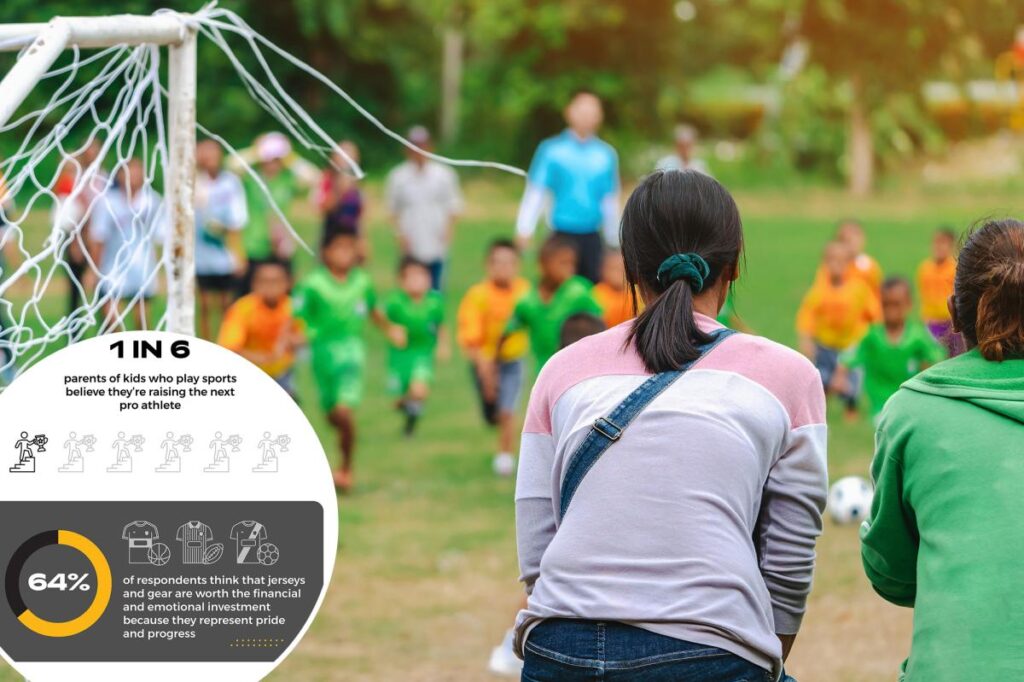One in six parents of kids who play sports believe they’re raising the next pro athlete, according to new research.
A survey of 4,150 respondents, split between athletes, parents, and coaches of youth athletes, looked at sentiments around what sports look like right now.
Seventy-two percent think that youth sports today feel more professional than recreational, with coaches experiencing this boost in intensity firsthand (85%).
With all of the work put in, two-thirds of parents think their child is above average (68%) — some even claiming that their child is destined for sports stardom (17%).
Conducted by Talker Research for BSN SPORTS, the survey found that all things considered, 92% would encourage young athletes to pursue sports, especially coaches (96%) and athletes (94%).
The average athlete (adult who is part of a sports club) surveyed spends nine hours a week on their sport, with eight in 10 parents agreeing that their child’s sports club has even become a second home for them.
From going to games, practice, and prepping for matches, parents estimate that they’re involved with 72% of their child’s experience — about eight hours a week.
More than a quarter said their child needs them nearly, if not, every step of the way (27%).
Time isn’t the only investment into these sports: The average athlete needs new equipment three times a year, spending an annual total of $313, and one in nine spend upwards of $500.
For 64%, jerseys and gear are worth the financial and emotional investment because they represent pride and progress.
Nine in 10 see the time and money spent on sports as an investment into the player’s future (88%), with coaches (96%) and parents (91%) especially understanding this value.
“The gear athletes wear isn’t just about performance, it’s about identity and pride,” said Brian Fleming, senior vice president and general manager of club and select at BSN SPORTS. “According to our findings, nine in 10 believe the time and money spent on sports is a meaningful investment in the player’s future. These choices reflect a deeper commitment not just to the game, but to the values, discipline, and identity that sports help shape.”
Parents believe playing sports instills confidence in their child (58%), while athletes shared that their habits help improve their mental health (58%), and coaches enjoy the way that it helps improve their sense of sportsmanship and teamwork (51%).
Looking at the growth of sports across the country, popularity has risen in basketball (44%), soccer (40%), football (35%), baseball (25%), and volleyball (22%).
Basketball is the top sport where more female participation is encouraged (42%), followed by soccer (39%), volleyball (37%), and softball (31%).
Thinking ahead to the future of sports, all three groups wanted to see skill improvement in the next year.
Parents and coaches also wanted to see increases in confidence and motivation, while athletes are most interested in seeing their fitness (39%) and mental health (37%) improve.
But how much is too much? Athletes and their parents recall experiencing burnout due to physical exhaustion or pressure, each twice a year.
Coaches may catch it even sooner, seeing their athletes burn out an average of three times a year for each.
For many, success is measured by their personal goals or passion for the sport (35%), social media pressure and public recognition (31%), and expectations from parents or family (31%).
According to those surveyed, the next generation of club sports should prioritize character and leadership development (42%), followed by balance and mental health (36%) and affordability and accessibility (34%).
Support may also be key to avoiding burnout, as nearly half believe that parent and sideline behavior at sporting events is mostly positive (48%).
“As youth sports become more immersive, it’s vital that families, coaches, and clubs align to support athletes in every aspect — from motivation to the basics like gear,” Fleming said. “This research shows how powerful that collective support can be in helping athletes thrive both in competition and character.”
Research methodology:
Talker Research surveyed 2,000 parents of youth athletes, 2,000 athletes and 150 club sport owners who have access to the internet; the survey was commissioned by BSN Sports and administered and conducted online by Talker Research between Oct. 14 and Oct. 27, 2025. A link to the questionnaire can be found here.
Read the full article here

















